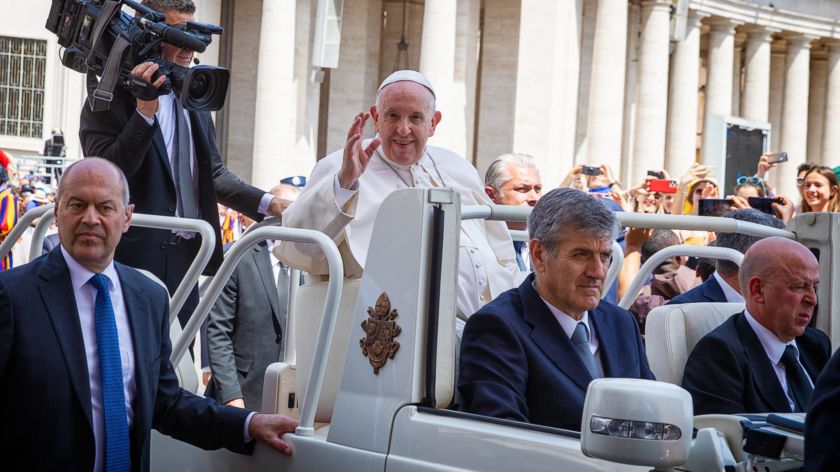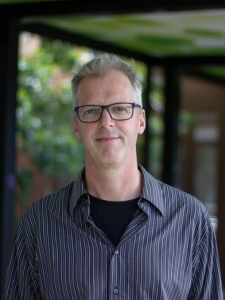New Nijmegen research institute is named after a letter from Pope Francis
-
 Paus Franciscus. Foto: Dick van Aalst
Paus Franciscus. Foto: Dick van Aalst
A new institute in Nijmegen conducting research on integral ecology will be officially opened this Friday. The Laudato Si' Institute is named after a letter from Pope Francis. ‘However, employees of our institute don’t need to be religious,' says Gerard Kuperus.
In a famous letter, Pope Francis calls for making the world more sustainable and just in the fight against climate change. With the establishment of the Laudato Si’ Institute this coming Friday, Radboud University is responding to that call.
Laudato Si’ (literally: ‘Praised be You’) is an encyclical or papal letter by Pope Francis from 2015. In the letter, the Pope describes climate change as a comprehensive physiological, social, political, and cultural problem, and calls on all people of goodwill to take action.
Short Meditation
At many Jesuit American universities, such as the University of San Francisco and Saint Xavier University, initiatives are based on the papal encyclical. At the secular British Oxford University, the largest Laudato Si’ Institute so far has been established by British Jesuits.
The Nijmegen institute will be inaugurated with a small symposium held in the university’s Aula. Among the speakers are the Bishop of Den Bosch, Gerard de Korte, who leads a short meditation, and Rector Magnificus José Sanders, who gives a speech.
According to the Vatican and the Dutch bishops, the Nijmegen university is still considered Catholic, although, due to a conflict with the then-foundation board, the bishops have had no formal role in the university’s governance since the fall of 2020.
Endowed Professor
Environmental philosopher Gerard Kuperus has been the first and currently the only staff member of the Nijmegen Laudato Si’ Institute since September. The eventual size of the institute is not yet clear. ‘The institute in Oxford has more than ten employees, which is, of course, very impressive,’ he says in his office in the Erasmus Building. ‘I hope that we will soon move towards five full-time equivalents (FTE).’

Scientists at the Laudato Si’ Institute are employed by Radboud University, with the exception of an
endowed professor. This professor is expected to be appointed in the spring of 2024 with funding from Socires. This is an independent foundation that reflects on culture and society, operating entirely on subsidies, including those from Catholic funds.
Research at the new institute must be related to sustainability or justice, the two themes addressed in Pope Francis’s letter. However, the researchers themselves do not need to be Catholic. ‘I am not either,’ says Kuperus. ‘We have academic freedom, there is absolutely no influence from the Roman Catholic Church on what we can or cannot do.’
The research at the institute must be open to Catholic thinking but does not have to be Catholic. In his letter, the Pope addresses not only Catholics but everyone of goodwill. It would also not be academically healthy to approach Laudato Si’ solely from a Catholic perspective.
Spiegelwaal
For the new institute, Kuperus is researching how the Netherlands deals with water. ‘We really see a policy change in that regard,’ he says. ‘In the past, we mainly tried to control water, but now space is also being given to rivers. The Spiegelwaal in Nijmegen is a good example of this. Or think of the Marker Wadden, which naturally reintroduce life to the Markermeer. I’m trying to see how that paradigm is slowly changing.’
The research of the new institute is certainly urgent, assures Kuperus. A recent greenhouse gas report from the UN revealed that the Earth is heading towards a global warming of 2.5 to 2.9 degrees. Only with ‘relentless intervention’ from the international community can the warming be limited to the absolute maximum of 2 degrees, as stated in the report.
‘Pope Francis calls for radical intervention’
‘Pope Francis calls for such radical intervention,’ says Kuperus. ‘We need to change ourselves, but also our society and economy. Laudato Si’ is essentially an anti-capitalist document; in the letter, Francis advocates for a different economy and opposes the growth of technology. However, this perspective is not well-received by all Catholics: from conservative Catholic circles, including the American bishops and Catholic members of the U.S. Congress, Laudato Si’ is often ignored.’
For more information about the opening of the Laudato Si’ Institute, you can follow this link. Prior to the opening, there will be a symposium titled ‘From Anthropocene to Symbiocene’.
Translated by Siri Joustra



